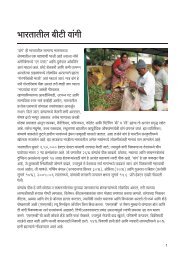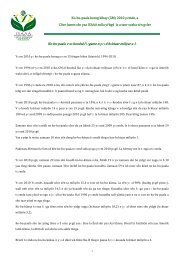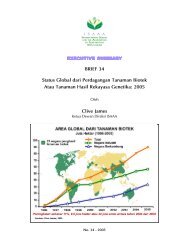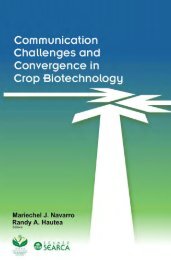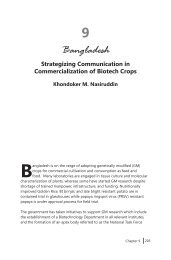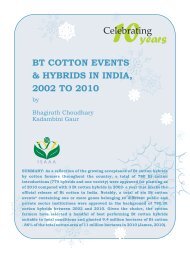Information Tug-of-War: Saga of Biotech Papaya 7 Agricultural - isaaa
Information Tug-of-War: Saga of Biotech Papaya 7 Agricultural - isaaa
Information Tug-of-War: Saga of Biotech Papaya 7 Agricultural - isaaa
You also want an ePaper? Increase the reach of your titles
YUMPU automatically turns print PDFs into web optimized ePapers that Google loves.
<strong>Information</strong> <strong>Tug</strong>-<strong>of</strong>-<strong>War</strong>: <strong>Saga</strong> <strong>of</strong> <strong>Biotech</strong> <strong>Papaya</strong><br />
on factual knowledge with policy makers, extension workers, and<br />
businessmen having comparatively higher scores but reflective <strong>of</strong><br />
only modest knowledge.<br />
• Attitude towards agricultural biotechnology was moderate with<br />
farmer leaders and journalists having either negative or moderate<br />
attitude. Stakeholders seemed to have more questions than answers<br />
about biotechnology, hence, were unable to make a definite position<br />
on the matter.<br />
• Stakeholders had dismal information seeking behavior probably<br />
because they do not know where to go for information; mass media<br />
does not adequately cover it; or the issue has not reached a level <strong>of</strong><br />
salience that can motivate people to seek additional information.<br />
Consumers and journalists were low information seekers with hardly<br />
or little motivation to seek out information about biotechnology.<br />
• University scientists and science magazines were perceived to be<br />
highly trustworthy sources <strong>of</strong> information. University scientists<br />
were regarded as sympathetic to public health and safety issues,<br />
and possessing the expertise to conduct risk assessment and risk<br />
management. This suggests that they can be very effective agents for<br />
educating the public about agricultural biotechnology.<br />
A survey <strong>of</strong> perception, understanding, and acceptance <strong>of</strong> GM plants and<br />
animals in Thailand was also conducted by the Asian Food <strong>Information</strong><br />
Center (AFIC, 2005) for BIOTEC. A total <strong>of</strong> 2,454 respondents were surveyed<br />
in six provinces throughout five regions <strong>of</strong> Thailand, namely, Ubon<br />
Rachathani, Chiang Mai, Nakhon Sawan, Nakhon Sri Thammarat, Sa Kaew,<br />
and Metropolitan Bangkok. The study aimed to survey the perception,<br />
understanding, and acceptance <strong>of</strong> biotechnology-derived plants and animals;<br />
and analyze the relationship between the educational and occupational<br />
background <strong>of</strong> survey respondents and their views.<br />
Similar to the findings <strong>of</strong> Juanillo (2003), understanding <strong>of</strong> biotechnology<br />
was generally low. Understanding was positively correlated with the<br />
respondents’ level <strong>of</strong> education as validated by a test measurement. The<br />
higher the level <strong>of</strong> education, the higher the proportion <strong>of</strong> respondents who<br />
answered questions correctly. Those who worked in related fields, i.e., nongovernmental<br />
organization (NGO) workers, academics and researchers, and<br />
Chapter 7 161



